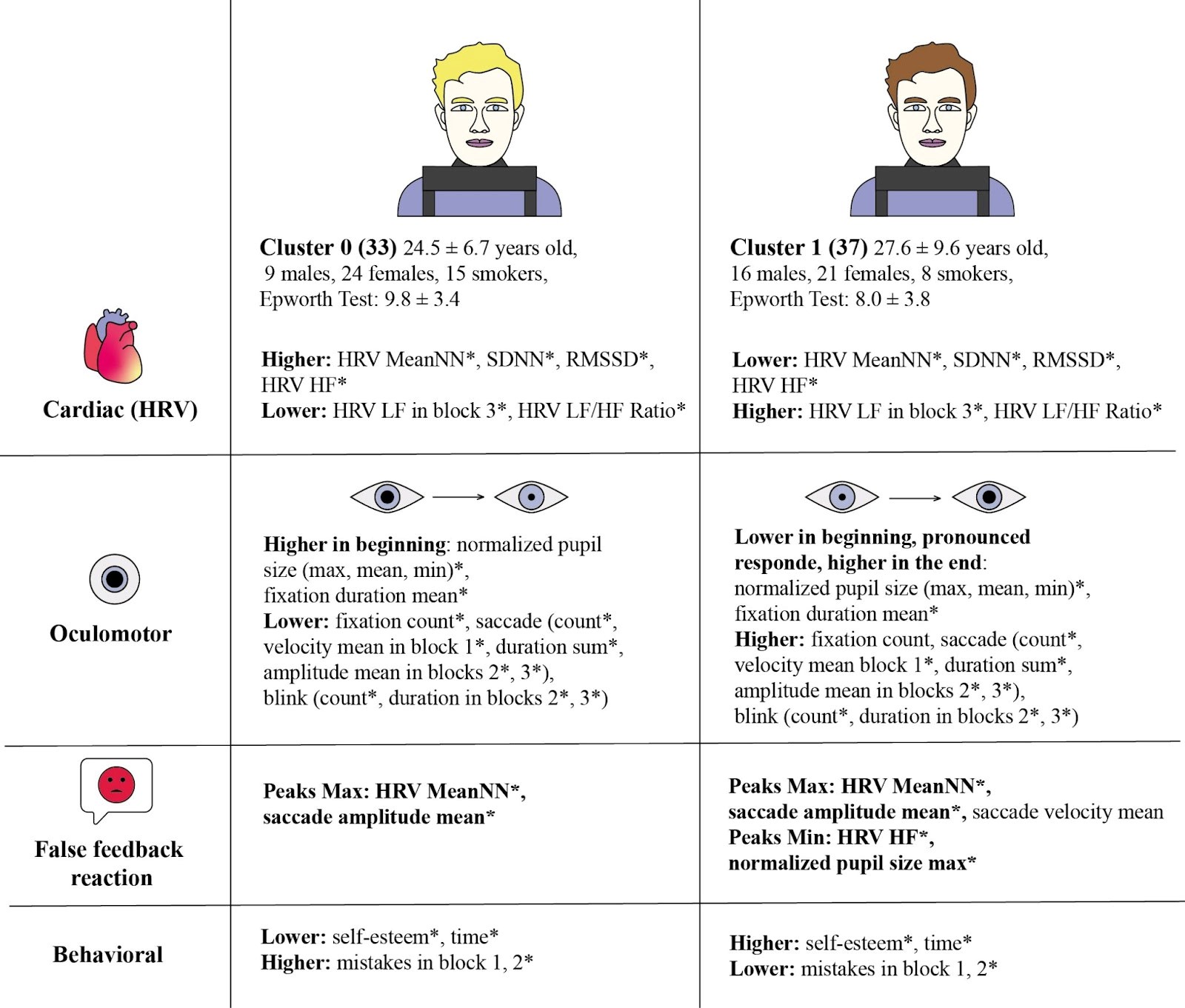Smoking Habit Affects Response to False Feedback

A team of scientists at HSE University, in collaboration with the Institute of Higher Nervous Activity and Neurophysiology of the Russian Academy of Sciences, studied how people respond to deception when under stress and cognitive load. The study revealed that smoking habits interfere with performance on cognitive tasks involving memory and attention and impairs a person’s ability to detect deception. The study findings have been published in Frontiers in Neuroscience.
In today’s world of information overload, one must remain vigilant and quickly adapt to changing circumstances to avoid deception or falling into the trap of fake information. Understanding individuals' ability to cope with stress and detect deception in challenging situations, alongside the related response of their body and brain, has become an important scientific objective today.
A group of researchers at HSE University and the Institute of Higher Nervous Activity and Neurophysiology of the Russian Academy of Sciences analysed people's responses to stress induced by cognitive engagement and examined their ability to detect deception attempts.
Seventy people participated in the experiment, completing memory and attention tasks of increasing complexity. Participants were instructed to view images of coloured balloons and compare each with the preceding one to identify colour matches. As the difficulty level increased, participants had to memorise more balloons and colours. Immediate feedback was provided after each response. Midway through the experiment, participants were given deceptive feedback, such as being told they made a mistake when their answer was actually correct.
Throughout the experiment, the researchers recorded participants' physiological responses and pupil dilation. Pupils respond to changes in the sympathetic ('fight or flight') and parasympathetic (relaxation) systems and are directly linked to cognitive processes; during cognitive stress, pupils dilate. Machine learning algorithms were used to classify participants into two clusters based on how their pupils reacted to increasingly complex tasks.

Next, the authors used machine learning to analyse a variety of physiological and behavioural parameters to identify differences between the two clusters of participants. The analysis considered individual data on health, the presence of chronic conditions, lifestyle factors, harmful habits (including smoking), and tendencies toward depression and anxiety disorders. During task performance, participants had their heart rate, skin conductance, and breathing monitored as polygraph parameters. In addition, the analysis included the speed of task completion, the number of errors made, and participants' self-esteem levels after completing the experiment.

Evgeniia Alshanskaia
'We were the first to employ dynamic pupillometry, which measures pupil dilation, to simultaneously analyse a wide range of physiological and neurological parameters, along with psychological factors. Changes in pupil size directly indicate how a person adapts to a stressful situation, revealing when they are relaxed and when they are mobilised. Thanks to advanced technology, we were able to process the entire dataset and identify patterns that would have been impossible to detect manually,' according to Evgeniia Alshanskaia, co-author of the study and Junior Research Fellow at the Institute for Cognitive Neuroscience.
The researchers obtained interesting results: in one of the clusters, participants exhibited a less pronounced response to stress, along with differing heart rate parameters and oculomotor behaviour, compared to the other cluster. At the same time, the former cluster answered the questions more quickly but made more mistakes, resulting in a lower self-assessment of their performance. This cluster included a higher number of smokers and individuals prone to excessive daytime sleepiness. These two parameters were found to differ significantly between the two clusters of participants. The researchers attribute the differences to the effects of nicotine on the body.

'Nicotine affects acetylcholine receptors throughout the body and the brain. Acetylcholine is the first neurotransmitter ever discovered. It helps control muscle movement, regulates heartbeat and breathing, and modulates pupil response, while also playing a crucial role in cognitive processes. It affects how we respond to and process information. When a person smokes, nicotine “tricks” these receptors into functioning improperly. On one hand, nicotine induces a relaxed state; on the other hand, it alters the connection between the brain and the body, making it more difficult to respond appropriately to stressful situations. Attention does not require relaxation and calmness; instead, it relies on optimal levels of stress and alertness,' explains Alshanskaia.
According to the authors, daytime sleepiness may also be linked to the exposure of nicotinic acetylcholine receptors to nicotine. These receptors regulate the activation and inhibition of neurons, modulate dopamine release, and influence the functions of the dorsolateral prefrontal cortex, which is responsible for planning and executive functions. 'Acetylcholine and its receptors represent one of the most significant areas of contemporary neurobiological research,' the authors emphasise.
The study's findings further highlight the serious impact of smoking on human health. These findings are also important for developing individualised strategies to enhance cognitive resilience under conditions of stress and information overload. Additionally, they can be valuable for educational purposes and learning tasks, as they contribute to a better understanding of the optimal levels of stress and cognitive load necessary for successful learning, performance, and resilience in an unpredictable world.
See also:
HSE Researchers Uncover Causes of Gender Pay Gap among Recent University Graduates in Russia
A study conducted at HSE University shows that despite having the same education and similar starting conditions, the pay gap between male and female recent graduates can be as high as 22%. This is partly because female students often choose less lucrative fields and also because they tend to seek jobs in sectors that offer lower pay but are perceived to have more stable and safer working conditions.
Scientists at HSE University Devise More Accurate Method for Predicting the Electrical Conductivity of Electrolyte Solutions
Researchers at HSE MIEM have developed a model for calculating the electrical conductivity of aqueous electrolyte solutions; for the first time, it considers the spatial distribution of ion charges instead of assuming their localisation at a single point. The model remains effective even at high electrolyte concentrations and across a wide temperature range. This breakthrough will contribute to the development of more efficient batteries and enable the calculation of electrical conductivity without the need for experimental testing. The study has been published in the Journal of Chemical Physics.
Russian Scientists Integrate Microdisk Laser and Waveguide on a Single Substrate
A group of Russian scientists led by Professor Natalia Kryzhanovskaya at HSE Campus in St Petersburg has been researching microdisk lasers with an active region based on arsenide quantum dots. For the first time, researchers have successfully developed a microdisk laser coupled with an optical waveguide and a photodetector on a single substrate. This design enables the implementation of a basic photonic circuit on the same substrate as the radiation source (microlaser). In the future, this will help speed up data transfer and reduce equipment weight without compromising quality. The study results have been published in Semiconductors.
Scientists Disprove Bunkbed Conjecture
Mathematicians from Russia, including two HSE graduates, have disproven a well-known mathematical conjecture that, despite lacking solid proof, had been considered valid for 40 years. The ‘Bunkbed Conjecture’ belongs to percolation theory—a branch of mathematics that studies the formation of connected structures in independent environments.
Men Behind the Wheel: Three Times More Violations and Accidents than Women
Men are three times more likely than women to commit traffic violations while driving and to be involved in accidents. Moreover, they are more likely to create situations on the road that are highly dangerous to others. Men are also twice as likely to drive under the influence and nearly one-third more likely to receive a prison sentence for reckless driving. Perhaps it comes down to cultural norms and the different attitudes men and women have toward driving. These are the conclusions reached by Anton Kazun, Assistant Professor at the HSE Faculty of Economic Sciences, and Research Assistant Mikhail Belov.
HSE Scientists Discover How to Predict Charitable Behaviour Through Physiological Reactions
Researchers at the HSE Institute for Cognitive Neuroscience have investigated how the emotional impact of advertising affects the amount people willing to donate to support animal welfare. To accomplish this, the researchers measured physiological responses such as heart rate, electrodermal activity, and facial expressions in individuals viewing various photos of dogs. The findings indicate that willingness to donate is most accurately predicted by heart rate and facial muscle activation. The study has been published in Social Psychology.
'We Are Creating the Medicine of the Future'
Dr Gerwin Schalk is a professor at Fudan University in Shanghai and a partner of the HSE Centre for Language and Brain within the framework of the strategic project 'Human Brain Resilience.' Dr Schalk is known as the creator of BCI2000, a non-commercial general-purpose brain-computer interface system. In this interview, he discusses modern neural interfaces, methods for post-stroke rehabilitation, a novel approach to neurosurgery, and shares his vision for the future of neurotechnology.
First Successful Attempt in 55 years: Physicists in Russia and Germany Confirm 1969 Experiment Results
A team of researchers, with the participation of physicists from HSE University, replicated the 1969 experiment on superconductivity and its properties. The scientists induced superconductivity by deliberately deteriorating the interfaces between the layers of superconductors and ferromagnets in the system, resulting in better performance of spin valves compared to the classical version, where the interfaces between the layers are ideal. This approach could lead to the development of more efficient devices for data storage and computing. The study findings have been published in the Beilstein Journal of Nanotechnology.
Healthy Nutrition Saves Public Funds: Strategies to Reduce Healthcare Costs in Russia
In Russia, the annual cost of treating type 2 diabetes alone exceeds 500 billion roubles. Promoting healthy nutrition programmes can ease the burden on the healthcare system and increase life expectancy. This was the conclusion reached by economists at HSE University after analysing global experiences with government involvement in promoting a healthy lifestyle.
Conscientious Individuals Live Longer
Personality traits such as conscientiousness, emotional stability, and an internal locus of control significantly influence one's lifestyle and longevity. Not only can personality traits influence health through beneficial and harmful habits but can also have a direct effect on mortality. Higher conscientiousness reduces the risk of premature death by 20 percentage points, while higher neuroticism increases it by 12 percentage points. These are the findings from a new study by Ksenia Rozhkova, Junior Research Fellow at the Laboratory for Labour Market Studies of the HSE Faculty of Economic Sciences.


